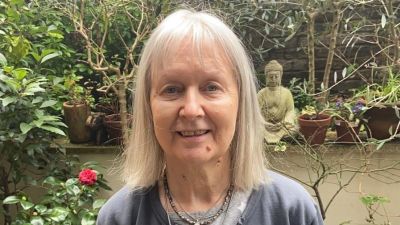'I don’t really know what Covid is. I expect it hasn’t been pleasant': Living with dementia in lockdown

By Will Tullis, ITV News
Every morning of the pandemic, Kate Condiffe wakes up to a world where Covid doesn’t exist. “I don’t really know what Covid is. I expect it hasn’t been pleasant,” she says. Kate suffers from dementia. She starts each day with no knowledge of Covid. Lockdown, social distancing and the dangers of coronavirus need to be explained to her every day. “I have to tell her there’s a serious virus that could kill us,” says Kate’s partner of 40 years Cordelia Galgut, “whatever I say is gone in a nanosecond.”
Kate is one of around 850,000 people in the UK with dementia. Like so many dementia sufferers, lockdown has had a significant impact on her condition: it has made her more confused, frustrated and miserable. Dementia sufferers across the country have “deteriorated horrendously” since the start of the pandemic, according to dementia care worker Sharon Lawson. “Covid’s taken their lives... it’s made them deteriorate and go down mentally when they otherwise wouldn’t have done.”
Dementia is a condition which is managed by interaction and stimulation, with physical contact often a key part of treatment. Lockdowns, social distancing and the risk Covid poses to people with dementia means that social and physical interaction has been put on hold. Dementia day centres and therapy groups across the country have had no choice but to close their doors until the virus is under control. “If you are sat in a room and you don’t see anyone you will deteriorate quickly...this is the effect Covid is having,” says Ms Lawson, who works for Age UK in Hull. She gives an example of a woman who was managing well with her dementia pre-pandemic: “She was absolutely fine, she had lots of stimulation. But now she can’t go out, her condition is horrendous.”
Leading dementia charities surveyed 1,001 people who care for someone with dementia. More than 92% said the pandemic had accelerated dementia symptoms in the person they care for.
Some 31% reported an increase in difficulty speaking and holding a conversation, and 25% reported the person they care for has difficulty eating by themselves. It isn’t just dementia sufferers who are struggling. Carers suffer alongside those directly impacted by the disease: “It is crucifying me...I’m on my knees with exhaustion,” says Kate’s partner and carer Cordelia, who works part-time as a psychologist. Cordelia is an expert in mental health, but there is no qualification that can prepare you for the grief of dementia. “I’m doing a lot of grieving for the person I’ve lost. I’ve lost my soul mate.” Unpaid carers have been the hidden heroes of the pandemic. According to Carers UK, there were 9.1m unpaid carers before the pandemic. By June last year, there were already 13.6m.
“Dementia sufferers and carers have been completely disregarded during the pandemic,” says Cordelia, “carers have gone without extra support in this period... what about us?” Next month is Kate’s 73rd birthday. “My ideal birthday present for Kate would be for her brain to work as it used to,” says Cordelia, “How wonderful that would be.”
Former ballerina with dementia remembers Swan Lake choreography
Barbara Windsor's husband reveals moment she didn't recognise him
If you or a loved one need assistance with dementia, call Alzheimer's Society's Dementia Support Line on 0333 150 3456 or visit Alzheimer's Society at https://www.alzheimers.org.uk/